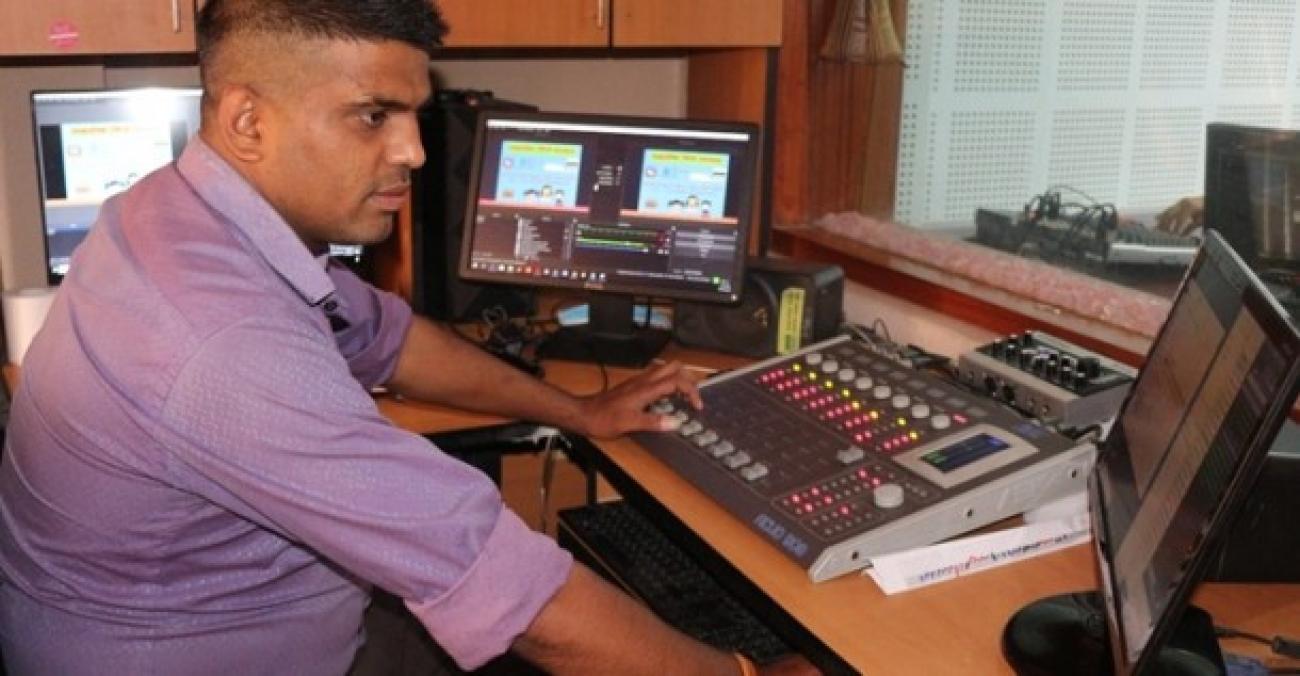COVID-19 Response: Learning moves from the classroom to radio in Nepal

“We must continue learning by taking this challenge as an opportunity.” These are the words of secondary school science teacher Mahesh Prasad Koirala from Nepal
“We must continue learning by taking this challenge as an opportunity.” These are the words of secondary school science teacher Mahesh Prasad Koirala from Nepal, during an interview carried out by Radio Pathshala, an educational radio programme that was recently launched, with UNESCO support, to teach learner’s in Nepal remotely during the school closures caused by the COVID-19 outbreak. The radio programme reached out to teachers and learners to hear how they have been affected by the school closures and to hear their views on Radio Pathshala.
To ensure that secondary students continue to have access to education, UNESCO, through the Capacity Development for Education (CapED) Programme, joined forces with Nepal’s Education Development Directorate, and Prime FM Radio. In May 2020, they launched Radio Pathshala, a pilot radio lesson initiative broadcast in the Bagmati Province, with teachers providing educational content and live call-in support to students.
Through CapED funds the initiative has now been scaled up through community radio in collaboration with the Ministry of Education, Science and Technology and Nepal’s Association of Community Radio Broadcasters (ACORAB) covering 77 districts in seven provinces throughout the country.
The country’s mountainous landscape and its remote hard-to-reach communities made distance learning through radio a suitable way to maximise continuity of learning. The merits of radio as a platform for education was echoed by secondary school teacher Tara Devi Adhikari Koirla who teaches grade 4 to 7. During the interview, she explains that, “radio education programmes are very effective in times of crisis… as not all families have access to internet, television, mobile, etc. Radio education has become effective and can be heard far and wide in the remotest nook and cranny.”
Likewise, Mahesh Prasad Koirala said that “In such circumstances as these, radio education programmes seem to be the most effective solution in a country like Nepal which has a unique social environment, social structure, and geographical inconveniences.” He believes that, although educators are no longer able to see their students face to face, they continue to play a vital role. “We teachers need to create an engaging environment by constantly keeping in touch with our students and their parent.”
Grade 10 student Manisha Lama from Namo Buddha Municipality, who was also interviewed by Radio Pathshala, misses the usual school day. She appreciates the radio programme but misses the discussions “you can have with teachers when you don’t understand a topic”. Grade 9 student Niresh Thakuri from the Panchkhal Municipality also misses the usual school experience. But states that “I love radio education very much. Because, even during the lockdown, FM Radio is teaching us with their hard work.” He is also glad that the radio lessons follow her school curriculum which he thinks will be beneficial.
A rapid assessment of the radio lessons through CapED funds was conducted after broadcasting the lessons for 10 days. 188 individuals took part in the assessment from all seven provinces. The findings so far are positive, indicating that the radio lessons are helping students continue their education.
This radio programme is one of many digital learning resources that have been developed by development partners, the private sector, and other government agencies in Nepal before and since the COVID-19 pandemic. To avoid duplication of resources being developed, UNESCO also conducted a mapping of existing digital learning resources to inform the government and development partners on gaps so that new, vital education resources can be developed.
In addition to this initiative, as part of the CapED COVID-19 response, UNESCO has been supporting an Education Cluster initiative to reach learners in remote and hard to reach areas by printing and distributing of home-based learning materials benefitting some 12,000 learners from Early Childhood Education to grade 3. UNESCO has also provided technical assistance to the Centre for Education and Human Resource Development (CEHRD) to develop a guideline for teachers and parents to facilitate remote learning and is also, alongside the Confederation of Nepali Teachers, training a team of teachers to deliver distance learning.



